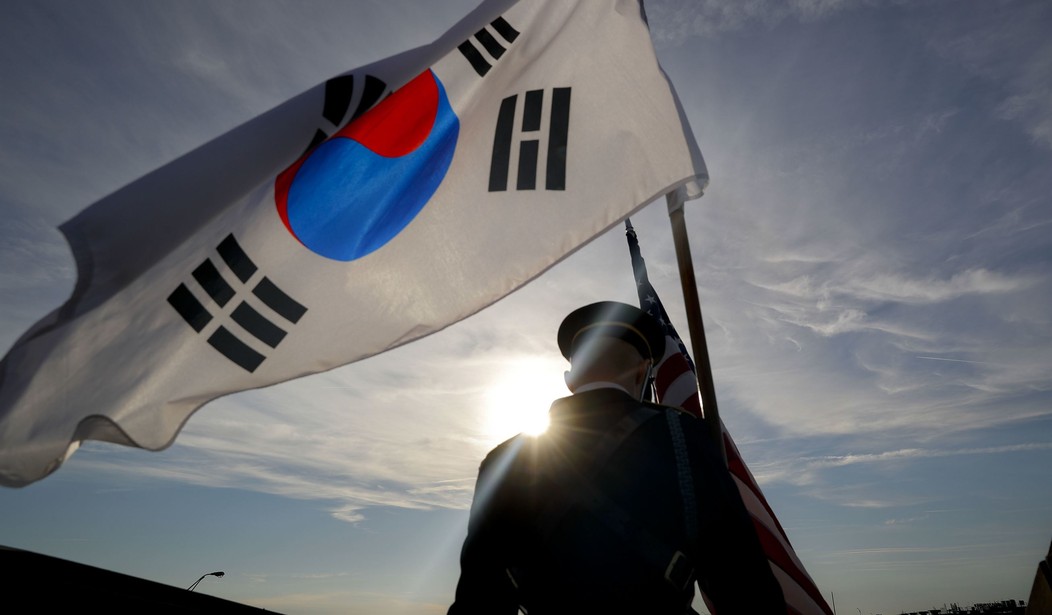Russia's invasion of Ukraine has stirred profound defense policy changes in Europe and Asia, with once-neutral Sweden's and Finland's bids to join NATO a prime example.
In East Asia, the invasion and Russian President Vladimir Putin's threats to attack his enemies' nuclear weapons has led South Korea and Japan to seriously consider acquiring nuclear weapons.
Background: the possibility of South Korea and Japan acquiring nukes is not new. Both technically adept nations have top-10 GDPs and high-tech infrastructure. In Japan, leaders have theorized about Japanese nukes. In 1957, then-Prime Minister Nobusuke Kishi told the Diet that he thought the pacifist postwar Constitution did not explicitly forbid Japan from having nuclear weapons -- if they were very small.
South Korea doesn't suffer from pacifism. Since roughly 2006, when North Korea's Kim regime threatened nuclear war, informed South Koreans quietly guarantee Seoul can build a nuclear device in short order. The South Korean nuke would not only detonate, but the missile delivering it would bull's-eye Little Rocket Man's bunker.
Ukraine has featured combat drones. Perhaps Kim Jong-un wanted to make a drone statement. In late December, several North Korean drones penetrated South Korean territory. On Jan. 4 South Korean president Yoon Suk-yeol said forcefully South Korea may deploy tactical nuclear weapons "or possess its own nuclear capabilities" if North Korean threats intensify.
The drone swarm constituted intensification.
In March 2022, following Russia's all-out invasion of Ukraine, former Japanese prime minister Shinzo Abe said very loudly Japan must urgently consider nuclear weapons. Abe wanted open, unapologetic and real-world debate.
Recommended
Current prime minister Fumio Kishida rejected Abe's suggestion, calling it "unacceptable." Kishida is from Hiroshima, a WWII nuclear target. That fact shapes his absolutist non-proliferation position.
However, from Russia's February 2014 attack on Crimea to this very minute, nuclear weapons have been the Ukraine war's deep global issue.
When Russia invaded Crimea, it violated a multilateral diplomatic agreement guaranteeing Ukraine's territorial integrity, the Budapest Memorandum of 1994. The agreement traded Ukrainian nuclear weapons for mutual security guarantees. At the time Ukraine had the world's third largest nuclear arsenal, some 5,000 weapons.
The U.S. and Britain backed it. Bill Clinton signed it. The memorandum was part of a larger post-Cold War diplomatic framework forwarding disarmament, economic development, constructive cooperation and democratic development in former Iron Curtain countries.
The Clinton administration, Ukraine and Britain thought they had solved the problem of ex-Soviet nukes and Ukrainian territorial sovereignty.
Obviously, they didn't. Now Ukraine confronts invasion and nuclear blackmail.
South Korea, lacking nuclear weapons, can identify. Nukes give Kim Jong-un his one shred of international prestige. With a ballistic missile, his reach extends well beyond Seoul.
Hence Kim's nuclear extortion racket: "Pay me off and guarantee the survival of my impoverished, criminal regime, or I'll nuke you and cost all of you more in lives and money than the bribes and media kowtow I demand."
North Korea's nuclear extortion drama, the repeated threat of nuclear attack followed by demands for food and financial aid, has exhausted South Korean and Japanese patience.
Russia's nuclear threats to Ukraine shows what happens when the extortion racket turns into a war.
For years, defense analysts have speculated on how long it would take Japan and South Korea to manufacture a nuclear device. The Federation of American Scientists once suggested Japan "could possibly produce functional nuclear weapons in as little as a year's time." In 2014, NBC reported that according to anonymous sources Japan had "the material and the means to produce nuclear weapons within six months."
With a nod and a wink South Korean sources give this estimate: "it won't take long."
A nuclear-armed Japan is a Chinese nightmare. China also knows Japanese and South Korean nuclear weapons would work.
China's communist dictator, Xi Jinping, can thank his friend Vlad Putin for prompting two wealthy Asian democracies to become regional nuclear powers.
























Join the conversation as a VIP Member